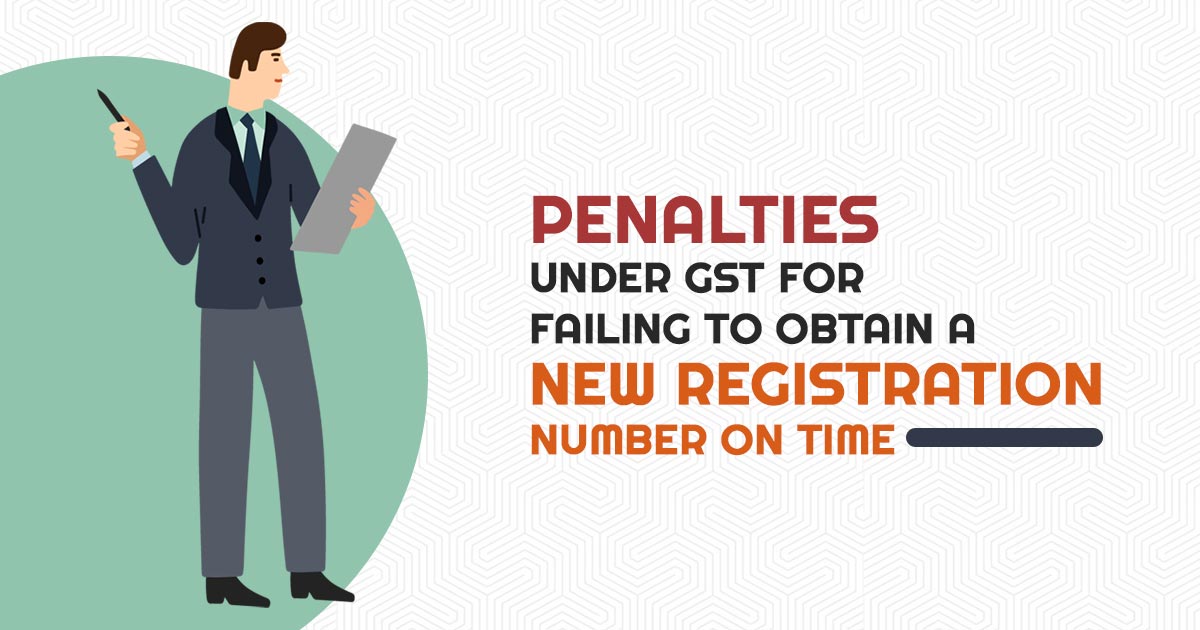
The article outlines the penalties for not obtaining a new GST registration number within the specified time frame.
The business is mandated to follow the Goods and Services Tax (GST) involved in the particular forms of trade and supply or surpass the established turnover limit in India.
The organization needs to get the new GST registration number within time. Unfollowing the same will direct you to pay the fines, difficulties with the law, and issues operating your business.
Importance of GST Registration
The businesses need to enrol with the GST whose yearly turnover exceeds Rs 40 lakhs (₹20 lakhs for service providers) and specific supplier categories, such as those concerned with interstate sales, online enterprises, and e-commerce operators.
When the business has a new GST registration number then they are enabled to collect the taxes legally from the clients and transfer the credit for filed input taxes.
GST Fine for Failure to Enroll New Registration Number on Time
For breaching GST registration regulations, the penalties and other legal consequences might have a detrimental impact on the financial stability and reputation of your company.
GST Penalty on Late Registration
For not enrolling to a new GST registration number in the stated duration the tax authorities may penalize a business.
Below is the penalty for failing to have the GST registration under the GST Act: 10% of the total tax liability, with a ₹10,000 minimum.
The fine may reach 100% of the amount owed in taxes if the tax avoidance is intentional. For the companies particularly the smaller ones, the same could be loaded as it has a quick effect on profitability.
Tax Payment Liability
The companies need to levy the GST on all goods counted within taxation if they do business without a new GST registration number. However, the firms could not avail the ITC on the purchases if they do not enrol accurately, which increases the total tax load. Also, they may asked to pay the interest on the GST they ignored to pay.
Interest Paid on Late Payment
The businesses are mandated to pay the interest on the due tax amount if the GST has not been paid in the said time due to registration failure. At 18% per annum, the interest is levied. Interest gets computed from the date on which the tax was due till the paid date. The same then increases the penalties for the non-compliance businesses.
Not Permit to Claim ITC without New Registration
The ability to avail the ITC on taxes filed on purchases is one of the influential advantages of registering for GST. A business without a New GST registration number is not permitted to claim the ITC. It directed that the taxes filed on the inputs become an added cost, lessening profitability and impacting cash flow.
Lawful Action Against Business
The government including the financial penalties may initiate legal proceedings against businesses that are unable to adhere to GST registration needs. Its consequences are:
- Seizure of goods
- Cancellation of business licenses
- Temporary or permanent closure of the business
Non-compliance may result in limitations on doing interstate sales and business with enrolled GST dealers, restricting the growth of businesses.
When You Are Required to Apply for a New GST Registration Number?
The businesses must apply for the New GST Registration Number as soon as they satisfy the eligibility criteria or start involving in taxable supplies. The same comprises businesses with a yearly turnover of more than the threshold limits, those making inter-state sales, or those engaged in e-commerce.
GST Registration Process
The business to avert penalties should apply for the new GST registration number via the GST portal. The process comprises of:
- Submission of an online application along with required documents such as PAN, Aadhaar, business address proof, and bank account details.
- Verification by GST officials.
- Issuance of a GSTIN (Goods and Services Tax Identification Number) after approval.
Registration within a time not merely assists in preventing penalties but indeed ensures facilitated business operations and legal compliance.
How to Avoid Penalties for Late GST Registration Number
Observe Turnover: Keep a consistent eye on your business revenue to make sure you apply for GST registration as soon as you surpass the limit.
Learning About Eligibility: Regardless of whether your revenue is beneath the threshold, determine if your business belongs to a specific category (such as inter-state sales or online operations) that necessitates mandatory registration.
Support Documentation: Make sure you have all the essential documents prepared for GST registration to prevent any delays in the application process.
Seek Professional Help: If you’re uncertain about the registration procedure, consider reaching out to tax experts or consultants who can help you acquire your New GST Registration Number promptly.
Closure: All businesses need to register for a new GST number promptly to steer clear of penalties, legal troubles, and financial pressure. Failing to comply with GST regulations can result in substantial fines, the denial of input tax credits, and legal issues that could significantly affect business operations.
By registering for GST promptly and being aware of eligibility requirements, businesses can make their tax processes more efficient and prioritize growth without encountering unnecessary legal or financial hurdles.